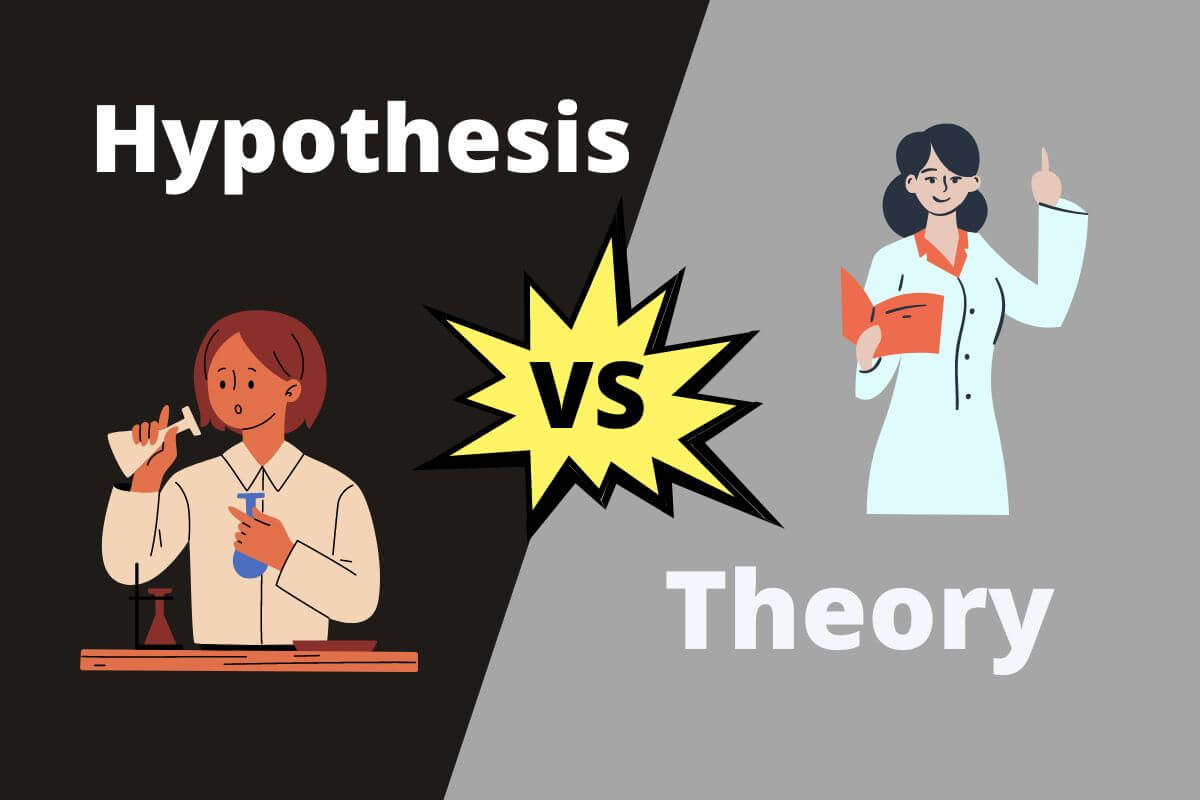A hypothesis is a reasoned prediction or proposed explanation of an observable phenomenon. But a theory is a well-substantiated and tested explanation of a natural phenomenon.
Hypotheses and theory are the two most common words used in the scientific community. But most people are unaware of the difference and use the words as synonyms. But are the two words the same?
Table of Contents
Hypothesis vs Theory
| Hypothesis | vs | Theory |
| No | Are they well substantiated? | Yes |
| Hypotheses rely on possibility or probability | Relies on | Theories rely on data, proof, and verification |
| No | Are they well tested? | Yes |
| Yes | Are they falsifiable? | Yes |
| Based on very limited data | Data | Based on a solid and wide range of data. These are tested under various circumstances |
| The purpose of a hypothesis is to give a direction to the proposed idea. | Purpose | The purpose of theory is to explain and understand a large set of observations consistently made throughout history. |
| If you predict that regular consumption of greasy or oily food will lead to health issues, it is a hypothesis. Another example is that getting 6 hours of sleep daily keeps your mind refreshed. | Examples | Darwin’s Theory of Evolution Einstein’s theory of general relativity The Heliocentric Theory The Big Bang Theory |
What is a Hypothesis?
A hypothesis is a suggested or predicted specification of a phenomenon. We can say it’s an educated guess about relations among multiple variables.
A hypothesis is a fresh idea that scientists or researchers propose before conducting research. It’s a tentative statement that the scientists will either support or disapprove through further experimentation.
In a way, a hypothesis is the first step or key of any scientific method. Let’s understand the hypothesis through a simple example.
For instance, saying that having sugary drinks every day leads to obesity is an example of a hypothesis.
Types of Hypotheses
- Simple hypothesis
- Directional hypothesis
- Complex hypothesis
- Non-directional hypothesis
- Associative and Casual Hypothesis
- Null hypothesis
How Does a Hypothesis Help Scientists?
A hypothesis is helpful to scientists in a variety of ways.
- Hypothesis helps with designing an experiment by forming relevant questions.
- It helps with the collection of data.
- Helps get background information.
- It gives a direction of how the experiment will work.
- The hypothesis also helps summarize the research.

What is a Theory?
A theory is rational conceptual thinking about a conceptual or natural phenomenon. Tests and experiments back theories and are widely accepted in the scientific community.
This means that scientific theories are unlikely to change.
The word theory is also used outside the scientific community. In other fields, theories may not have the same leverage as scientific theories due to the lack of tests and experiments.
Unlike a hypothesis, a theory is not a prediction, but an established fact that is widely accepted.
Examples of Widely Accepted Scientific Theories
- The Heliocentric Theory– This theory proved that the earth revolves around the sun.
- The Big Bang Theory– According to this theory, the universe started as a small singularity billions of years ago and expanded suddenly.
- Theory Of Evolution by Natural Selection– Charles Darwin invented this theory, stating that the gradual changes in the population of organisms over time led to the invention of specific traits that allow those organisms to survive.
- The Theory Of Relativity: This theory was invented by Albert Einstein. This theory claims that giant objects like the planets distort space-time. Einstein’s theory superseded another famous theory of gravitation by Newton.

Difference Between Hypothesis and Theory
Meaning
A theory is a definite information or ration conceptual thinking about a hypothesis. In a way, we can say that a theory is the further investigation of a hypothesis that either proves the hypothesis wrong or right.
But the hypothesis is based on solid data, tests, experiments, or scientific laws. It is a mere prediction to give direction to research work.
Certainty of Results
In theory, results are certain. It will either prove the phenomenon wrong or right. But in a hypothesis, the results are not certain. A hypothesis is simply a prediction about a certain event, so it does not put enough emphasis on the results.
Data Collection
The data collection process of a theory is quite rigorous. Scientists go through a wide range of data to prove a specific theory. This is why theories take years to be presented in front of the world.
But the data collection for the hypothesis is not that rigorous. So a hypothesis does not even take half the time of a theory.
Acceptance
Theories are universally accepted because reliable data back them. But a hypothesis isn’t universally accepted because any solid scientific data or test does not back it. It is just a tentative explanation of probability.
Know the Difference
Remember that a hypothesis is a prediction that gives direction to any scientific method.
A theory, however, is a solid proof of natural phenomena, backed by tests and experiments. Theories are also universally accepted, so they are unlikely to change.
If you’ve enjoyed this article, check out our post on the difference between precision and accuracy.

